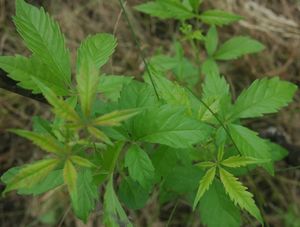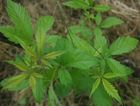Note: This is a project under development. The articles on this wiki are just being initiated and broadly incomplete. You can Help creating new pages.
Difference between revisions of "Vitex negundo"
(→Common names) |
(→Photo Gallery) |
||
| (4 intermediate revisions by 2 users not shown) | |||
| Line 1: | Line 1: | ||
| − | |||
[[Image:Vitex negundo leaves.jpg|thumb|right]] | [[Image:Vitex negundo leaves.jpg|thumb|right]] | ||
'''Vitex negundo''' is a much branched shrub. It grows up to 8 metres tall. | '''Vitex negundo''' is a much branched shrub. It grows up to 8 metres tall. | ||
| − | It is a multipurpose shrub, it is used for traditional medicine, yields an edible seed and provides various other commodities. It is cultivated as a hedge and medicinal plant, and is also sometimes grown as an ornamental. | + | It is a multipurpose shrub, it is used for traditional medicine, yields an edible seed and provides various other commodities. It is cultivated as a hedge and medicinal plant, and is also sometimes grown as an ornamental. This plant is belongs to Verbenaceae family.<ref name="Plant family"/> |
| − | |||
==Uses== | ==Uses== | ||
{{Uses|Cough}}, {{Uses|Diarrhoea}}, {{Uses|Backache}}, {{Uses|Joint pain}}, {{Uses|Stops gum bleeding}}, {{Uses|Toothache}}, {{Uses|Arthritis}}, {{Uses|Joint pain}}.<ref name="Uses"/> | {{Uses|Cough}}, {{Uses|Diarrhoea}}, {{Uses|Backache}}, {{Uses|Joint pain}}, {{Uses|Stops gum bleeding}}, {{Uses|Toothache}}, {{Uses|Arthritis}}, {{Uses|Joint pain}}.<ref name="Uses"/> | ||
| Line 11: | Line 9: | ||
==Chemical Composition== | ==Chemical Composition== | ||
| − | <ref name="chemical composition"/> | + | Volatile oil of Vitex negundo is reported to contain β-carryophyllene, sabinene, linalool, terpinen-4-ol, α-guaiene and globulol as major constituents along with sesquiterpenes, monoterpenes, terpenoids and sterols.<ref name="chemical composition"/> |
==Common names== | ==Common names== | ||
{{Common names|sa=Indrani, Nirgundi|en=Five-leaved chaste tree, Indian privet|gu=Nagod|hi=Indrani, Nirgunthi|kn=ಇನ್ದ್ರಾಣಿ Indrani, ಕರಿ ಲಕ್ಕಿ Kari lakki, ಲಕ್ಕಿ ಗಿಡ Lakki gida|ks=|ml=Karinocchi, Nocchi|mr=Indrani, Niguda|pa=Marwande|ta=Karu-nocci, Nocci|te=Nirgundi, Sambali}} | {{Common names|sa=Indrani, Nirgundi|en=Five-leaved chaste tree, Indian privet|gu=Nagod|hi=Indrani, Nirgunthi|kn=ಇನ್ದ್ರಾಣಿ Indrani, ಕರಿ ಲಕ್ಕಿ Kari lakki, ಲಕ್ಕಿ ಗಿಡ Lakki gida|ks=|ml=Karinocchi, Nocchi|mr=Indrani, Niguda|pa=Marwande|ta=Karu-nocci, Nocci|te=Nirgundi, Sambali}} | ||
| + | <ref name="Common names"/> | ||
==Properties== | ==Properties== | ||
| Line 63: | Line 62: | ||
<gallery class="left" caption="" widths="140px" heights="140px"> | <gallery class="left" caption="" widths="140px" heights="140px"> | ||
Image:Vitex negundo leaves.jpg | Image:Vitex negundo leaves.jpg | ||
| − | + | Vitex negundo L. (465849516).jpg | |
| − | |||
</gallery> | </gallery> | ||
==References== | ==References== | ||
<references> | <references> | ||
| − | + | <ref name="chemical composition">[https://ijpsr.com/bft-article/phytochemical-and-biological-evaluation-of-vitex-negundo-linn-a-review/?view=fulltext#:~:text=Volatile%20oil%20of%20Vitex%20negundo,%2C%20monoterpenes%2C%20terpenoids%20and%20sterols. Chemical constituents]</ref> | |
| − | <ref name="chemical composition">[ | + | <ref name="Common names">[https://sites.google.com/site/indiannamesofplants/via-species/v/vitex-negundo Common names]</ref> |
| − | |||
<ref name="Leaf">[Morphology]</ref> | <ref name="Leaf">[Morphology]</ref> | ||
| − | |||
<ref name="How to plant/cultivate">[Cultivation]</ref> | <ref name="How to plant/cultivate">[Cultivation]</ref> | ||
<ref name="Uses">Indian Medicinal Plants by C.P.Khare</ref> | <ref name="Uses">Indian Medicinal Plants by C.P.Khare</ref> | ||
| + | <ref name="Plant family">Karnataka Aushadhiya Sasyagalu By Dr.Maagadi R Gurudeva, Page no:303</ref> | ||
</references> | </references> | ||
Latest revision as of 13:10, 6 June 2023
Vitex negundo is a much branched shrub. It grows up to 8 metres tall. It is a multipurpose shrub, it is used for traditional medicine, yields an edible seed and provides various other commodities. It is cultivated as a hedge and medicinal plant, and is also sometimes grown as an ornamental. This plant is belongs to Verbenaceae family.[1]
Contents
- 1 Uses
- 2 Parts Used
- 3 Chemical Composition
- 4 Common names
- 5 Properties
- 6 Habit
- 7 Identification
- 8 List of Ayurvedic medicine in which the herb is used
- 9 Where to get the saplings
- 10 Mode of Propagation
- 11 How to plant/cultivate
- 12 Commonly seen growing in areas
- 13 Photo Gallery
- 14 References
- 15 External Links
Uses
Cough, Diarrhoea, Backache, Joint pain, Stops gum bleeding, Toothache, Arthritis, Joint pain.[2]
Parts Used
Chemical Composition
Volatile oil of Vitex negundo is reported to contain β-carryophyllene, sabinene, linalool, terpinen-4-ol, α-guaiene and globulol as major constituents along with sesquiterpenes, monoterpenes, terpenoids and sterols.[3]
Common names
| Language | Common name |
|---|---|
| Kannada | ಇನ್ದ್ರಾಣಿ Indrani, ಕರಿ ಲಕ್ಕಿ Kari lakki, ಲಕ್ಕಿ ಗಿಡ Lakki gida |
| Hindi | Indrani, Nirgunthi |
| Malayalam | Karinocchi, Nocchi |
| Tamil | Karu-nocci, Nocci |
| Telugu | Nirgundi, Sambali |
| Marathi | Indrani, Niguda |
| Gujarathi | Nagod |
| Punjabi | Marwande |
| Kashmiri | |
| Sanskrit | Indrani, Nirgundi |
| English | Five-leaved chaste tree, Indian privet |
Properties
Reference: Dravya - Substance, Rasa - Taste, Guna - Qualities, Veerya - Potency, Vipaka - Post-digesion effect, Karma - Pharmacological activity, Prabhava - Therepeutics.
Dravya
Rasa
Guna
Veerya
Vipaka
Karma
Prabhava
Habit
Identification
Leaf
| Kind | Shape | Feature |
|---|---|---|
Flower
| Type | Size | Color and composition | Stamen | More information |
|---|---|---|---|---|
| {{{5}}} |
Fruit
| Type | Size | Mass | Appearance | Seeds | More information |
|---|---|---|---|---|---|
Other features
List of Ayurvedic medicine in which the herb is used
Where to get the saplings
Mode of Propagation
Cuttings of half-ripe wood, Seeds.
How to plant/cultivate
Vitex negundo can be grown in warm temperate to tropical areas, succeeding at elevations from sea level to around 2,000 metres. It is found in areas where the mean annual rainfall is in the range of 600 - 2,000mm. It can tolerate short-lived temperatures falling down to about -10°c.[6]
Commonly seen growing in areas
Photo Gallery
References
- ↑ Karnataka Aushadhiya Sasyagalu By Dr.Maagadi R Gurudeva, Page no:303
- ↑ Indian Medicinal Plants by C.P.Khare
- ↑ Chemical constituents
- ↑ Common names
- ↑ [Morphology]
- ↑ [Cultivation]
External Links
- Ayurvedic Herbs known to be helpful to treat Cough
- Ayurvedic Herbs known to be helpful to treat Diarrhoea
- Ayurvedic Herbs known to be helpful to treat Backache
- Ayurvedic Herbs known to be helpful to treat Joint pain
- Ayurvedic Herbs known to be helpful to treat Stops gum bleeding
- Ayurvedic Herbs known to be helpful to treat Toothache
- Ayurvedic Herbs known to be helpful to treat Arthritis
- Herbs with Root used in medicine
- Herbs with Leaves used in medicine
- Herbs with Seeds used in medicine
- Herbs with common name in Kannada
- Herbs with common name in Hindi
- Herbs with common name in Malayalam
- Herbs with common name in Tamil
- Herbs with common name in Telugu
- Herbs with common name in Marathi
- Herbs with common name in Gujarathi
- Herbs with common name in Punjabi
- Herbs with common name in Sanskrit
- Herbs with common name in English
- Habit - Deciduous Shrub
- Index of Plants which can be propagated by Cuttings of half-ripe wood
- Index of Plants which can be propagated by Seeds
- Herbs that are commonly seen in the region of Mixed thickets
- Herbs


